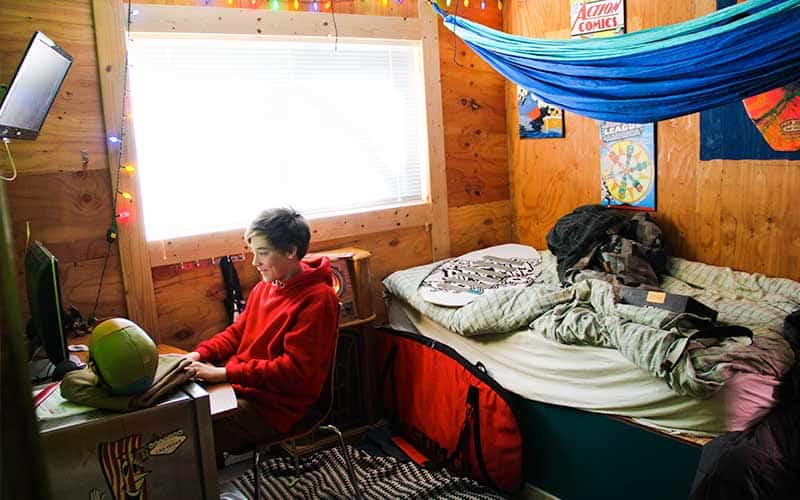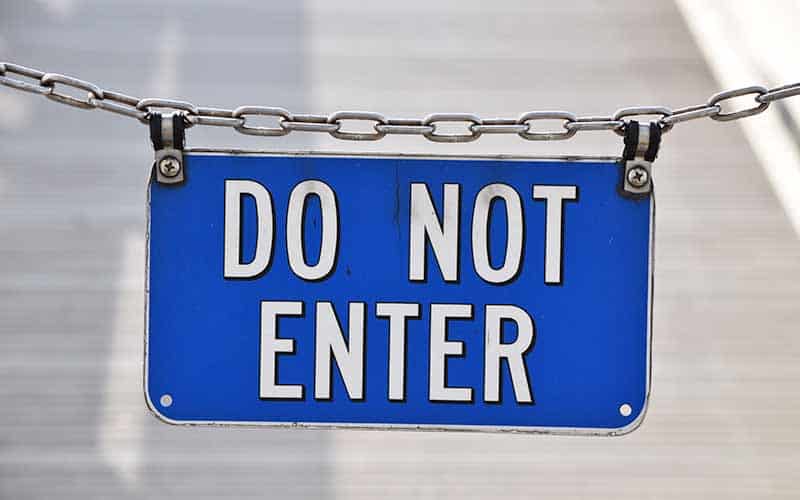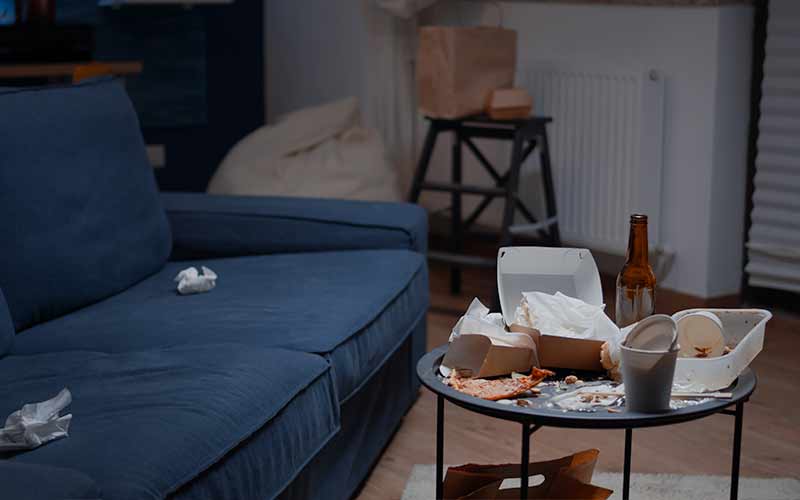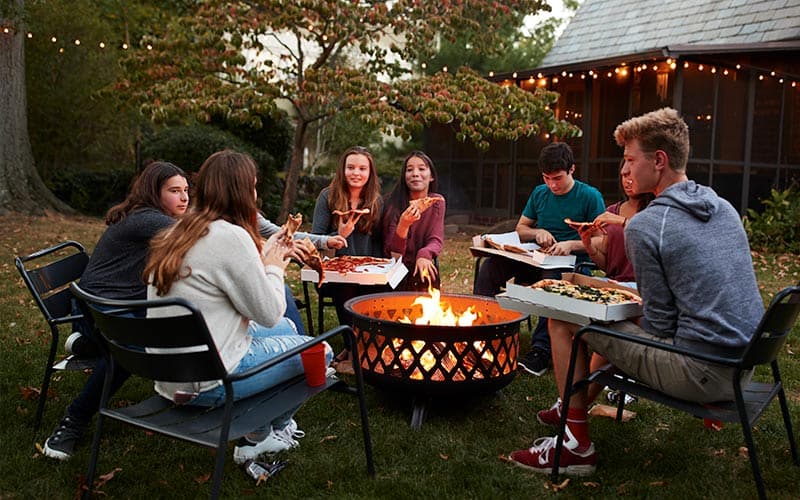Before we even get started on this list of household rules for teenagers, I want to make it abundantly clear that I don’t expect you to assign every single one of these rules to your own household.
Pick the ones that make sense for your home, or suit the types of lessons and ideals you’re trying to instill in your teen.
Every teen is different, and your kids might need a bit more structure in certain areas, and a bit less structure in other areas, and your household will have it’s own set of needs and chores and things that need to be done.
See also: Should You Have Rules for an 18 Year Old Living at Home?
About House Rules for Teenagers:

Okay, with that out of the way, I put together this list of household rules for teens to follow so that you’ll have a big list to choose from. I’ve also included detailed descriptions for most of these house rules for teens, but if you just want to print off a PDF file that lists the rules, along with a house rules and consequences chart that you can fill in yourself.
Are there good house rules and bad house rules?
There are. There are styles of rules that have been proven to be much less effective, or even harmful, and the same goes for the consequences.
It’s up to you to decide which styles of rules are suited for your home and your situation, so please cherry pick the ones that will address the things you want to enforce in your household, but remember there should be some leeway, and ideally, this should be a conversation that you have with your
How to Enforce Household Rules for Teenagers (House Rules and Consequences)
This is where things can get a bit trickier for many parents, especially once their teenagers are 18 and 19 years old, which gives them many of the privilidges of being an adult in many parts of the world.
It’s one thing to set the rules, but if you aren’t enforcing them, it doesn’t really help unless your teenager is already willing and prepared to follow the rules without really needing them in the first place.
Learn more about punishments for teenagers.
What happens if your teen breaks the rules? That should depend on the rule, how willfully they broke it, if this is an opportunity to learn and it seems like someone they won’t do again, or if it’s a recurring issue.
There’s a saying about the punishment matching the crime, and ideally, the punishment will help to enforce the rule. Otherwise, the punishment can just feel vindictive or like you’re trying to hurt them for something totally unrelated to what they did wrong.
At the end of the day, you want your teenager to LEARN. They’re still young, they’re going to make mistakes, and the goal is to set them up so that they don’t make the same mistakes and so that they’re in a good position to take care of themselves through life.
Why Are Family House Rules for Teens Important?
Rules are part of the world. There are good rules, and bad rules. Our goal is to create good household rules for teens that have a purpose, that the teen understands and agrees with, and will work to uphold.
As a parent, especially if you’re more of a free spirit or have some trepidation about authority, it can feel a little strange to impose rules on your teenager but it’s good for them to get a sense of structure and to understand that rules can exist for good reasons.
There are rules all throughout our life and some of them are easier to accept than others. The rule that says you’re 5 minutes late to redeem a coupon to get a free drink with your burger is an annoying rule that feels a bit arbitrary or petty. Traffic rules to help prevent car accidents, on the other hand, make a lot of sense for creating a safer society.
So, with your house rules for teens, keep these things in mind, and choose from the following rules in a way that will help shape your home in the way that you’d like it to be.
List of House Rules for Teens
Here’s our list of rules for a teenager to follow at home. You don’t have to use all of these rules, of course. These are written from the point of view of a parent explaining these rules to their teens, and are meant to give you inspiration. You’re not meant to take every single one of these house rules for teens and implement them in your home; just pick the ones that work for you and your family.
33. Respect your area in the home.

- Purpose of this rule: It teaches responsibility and the importance of looking after your own space.
- Possible consequences: If I notice that you’re not taking care of your areas in the home, then you’ll have less privileges and less space of your own until you start to maintain it better.
As you get older and more mature, you’ll have more and more control over your own areas in this home. This is part of growing up. I’ll come into your room less often, and give you more privacy, but the trade-off is that there are things you need to stay on top of it.
You have to clean up after yourself everywhere in the house, but this is especially true for your own areas. It feels better to be in a clean and organized space, too, and it’s an important habit to develop before moving out on your own.
32. Prioritize your responsibilities including homework and chores.

- Purpose of this rule: To enforce that there are certain things that need to be done before other things. You can play games and relax, but please take care of what’s more important first.
- Possible consequences: If you aren’t prioritizing your responsibility at home, you will lose access to games, electronics, or going out until you’ve caught up on your responsibilities including chores and homework.
Even if you hate it, homework is important. You can do your best to stay on top of it by working on it at school, at lunch break, on the weekends, and so on. If you aren’t keeping on top of your homework, then we need to figure something out and that something will usually involve finding a way to make sure you’re working on it at home.
The same applies for your chores and other responsibilities. These types of things need to come first. This doesn’t mean you need to finish all of your projects the second they’re assigned, or stay on top of all of your chores every single day – we can be reasonable and have some leeway for you, but in general you need to be focusing on these things.
31. Follow all the rules of the road if you borrow the car.

- Purpose of this rule: Borrowing the car is a massive privilege and something you’re very lucky to do, and it comes with a price which is that you have to be respectful of the house rules to have any hope of taking the car out.
- Possible consequences: Easy, if you break certain rules, you can lose access to your car – especially the next rule that’s coming up, number 30 on this list of house rules for teenagers.
Teenagers don’t always realize how big of a responsibility it is to drive a vehicle, but it’s huge. Being irresponsible in a car can change your life forever, or the lives of anyone else on the road. Looking away for a split second can be devastating.
There are serious consequences in this world for distracted or impaired driving, and I’m not just talking about the law. You can ruin someone’s life. You can ruin your own life. This is a massive responsibility and it’s something that you need to acknowledge and be mindful of anytime you’re behind the wheel.
You need to drive safely and defensively. You can’t let your teenage hormones or emotions push you towards driving recklessly, no matter how your friends behave behind the wheel.
30. No texting and driving, ever.

- Purpose of this rule: To save your life and the lives of other people on the road.
- Possible consequences: Losing access to the car, full stop.
It’s tragic to think of the lives that are lost due to distracted driving, and in this home, we will never contribute to those statistics. Texting and driving is one of the most mindless, selfish things you can do.
It only takes a second to pull over to look at your phone and respond to a message, trying to do it while you’re driving while also hiding your phone and taking your eyes off the road is an awful thing to do.
There’s no message you’re getting that is important enough to put yourself, the car, and other people at risk. You can seriously mess up your life behind the wheel of a car, or you might just lose your car privileges but either way it’s a bad outcome – so just don’t do this. It’s a non-negotiable.
29. If you’re at a party and you need a safe ride, call home.

- Purpose of this rule: To keep you safe and to protect you from getting into bad or uncomfortable situations.
- Possible consequences: The consequences of getting into an unsafe ride or being at an unsafe party extend far beyond any punishments I could give you.
You’re a teenager, you’re going to go out with friends, and there might come a night where you decide to experiment with alcohol or other substances. I don’t encourage this, I don’t promote it, but if you have the car and you decide to drink, I want you to call home and let us know instead of just trying to drive home under the influence.
You won’t be punished if you call for a safe ride home instead of driving yourself or getting into the car with a friend that’s under the influence. You’ll be punished if you DON’T call for a safe ride home, so please make the correct decision.
I will help get your friends home safely too, and we can talk about keeping it a secret so that nobody else gets in trouble, as long as this is a one-time thing and you learn from it and discourage your friends from doing this again.
28. Keep us aware of where you’re going when you head out.

- Purpose of this rule: I need to know where you’re at when you’re out and about. Not down to the exact coordinates, but if you’re going to the mall, let me know. If you’re going to a friend’s house, let me know.
- Possible consequences: If you’re going out and keeping where you are a secret, you’ll lose certain privileges and freedoms because trust is important but it’s also important to stay safe and make sure I know where you are in case anything goes wrong or I don’t hear back from you.
It’s not hard to send a quick text when you’re heading out, or planning to go somewhere with friends, or to a friend’s house. If your phone dies and I need to contact you for an emergency, I want to know which of your friends I can reach out to, or whose parents to call if something goes wrong.
I’m not going to hound you and hassle you all day to know exactly what you’re up to, you can earn freedoms and trust, but they have to be earned and maintained.
27. Do something that challenges you everyday.

- Purpose of this rule: To push yourself, learn your limits, and achieve things you didn’t know you could do.
- Possible consequences: You won’t be punished for not challenging yourself enough, as long as you’re keeping on top of your priorities and what matters around the house, but I just want to encourage you to push yourself and realize your potential.
I never want to hear you have a mentality like “I can’t do this, what’s the point in trying?” I want you to try. It’s better to try and to fail miserably than to not try at all. I’d rather see you fail at something 10 times than sit around and not even give it a try.
Whether it’s art, athletics, science, or pursuing a new goal or hobby – I want to encourage you to take chances and go for it (within reason), because it’s your life and you need to see what you’re capable of.
26. Make the most of the opportunities you’ve been given.

- Purpose of this rule: Take advantage of the gifts you’ve been given and put the work in to make the most of your opportunities.
- Possible consequences: This is another rule where the consequences won’t come from me, they’ll come from life and the world. It’s hard to explain this to you right now, but please pay attention and do your best.
We may not have the most perfect home, or the most perfect life, or all of the things that all of your friends have but I’ve worked hard to create this life and to give you as many opportunities as I can.
I want to see you succeed and live a happy, fulfilling life and that means using the advantages I’ve helped earn for you, and using that as a stepping stone to work towards the things that you want to get out of your life.
I can’t decide what you find fulfilling or meaningful in life, but I want to give you all of the resources to be able to explore those things for yourself.
25. Understand that trust is earned and can be lost.

- Purpose of this rule: To teach valuable life lessons and skills that will help you interface with the world around you.
- Possible consequences: The consequences of being dishonest are that you will lose trust, which means you’ll lose certain privileges or benefits of the doubt that you’re currently enjoying.
Some people are easier trusting than others. You’re lucky, your parents or guardians have some built-in trust for you, but it can be damaged. With some people, you’ll be able to earn that trust back (like with me) but with many people in life, you can’t really repair broken trust.
I want you to learn the importance and value of trust in a safe environment at home, so that when you go out into the world, you’re able to be an honest, upfront, and trusting person.
24. Stop what you’re doing and listen when we’re talking.

- Purpose of this rule: To stop me from losing my mind trying to talk to you while half of your attention is focused on your screen, and the other half is focused on what’s playing in your headphones.
- Possible consequences: The consequences of making someone very frustrated when they’re trying to talk to you are never good, whether they’re telling you good news or bad news.
If I’m trying to tell you something, I need you to listen. If we’re having a friendly chat and I interrupt you when you’re in the middle of something, you don’t necessairly have to give me your full attention that instant, I’m a reasonable person. However, when it’s time to have a talk, you can put down your phone for a few minutes, or pause your game, or tell me that you’re busy for the next 5-10 minutes and I’ll come back.
It’s okay to say, “Hey, I’m a bit busy right now, if it’s not urgent, can we please talk about this a bit later when you’ll have my full attention?” That’s the mature way to do it, instead of pretending to pay attention while you keep looking at your phone and say “yeah, yeah… okay… yeah…” without absorbing the information, meaning I’ll have to end up repeating everything a few days later, anyways.
23. Be respectful when guests are over.

- Purpose of this rule: It’s important for guests to feel comfortable in our home. We can’t have to be phony or put on masks and a show for them, but we do need to be on our better behavior.
- Possible consequences: As a family, we’re real people, sometimes we’re annoyed at each other, sometimes we’re frustrated. When company is over, we want to ensure everyone is comfortable, and times that means just doing your best to be respectful.
If family is over for a visit, come spend some time with everyone. Don’t worry, you can go off and do your own thing after a while, but don’t stay cooped up in your room the entire time and don’t make me have to yell for you to come say hello.
If you hear that family or family friends are over, and you come out of your room and make an effort to say hello and to chat for a little while, that way we won’t have to make a big deal and drag you out. If you show mindfulness of this, I won’t make you sit and visit all day, just come say hello for a few minutes!
22. Practice basic manners, you don’t have to be an etiquette expert, though.

- Purpose of this rule: Manners are essential to move through the world, having decent manners can make life a lot easier and it makes people around you feel good, too.
- Possible consequences: The consequences of bad manners are hard to measure, but basically put, good manners will serve you positively in so many different ways in your life.
I don’t expect you to learn the perfect type of fork to use for each part of a meal and to perfectly set the table according to Victorian standards or anything crazy like that, but when somebody goes out of their way to do something for you, say thanks.
When grandma sends you cookies or a card during the holidays, write her a little note saying things. When I bring you dinner to your room so that you can keep focusing on whatever you’re doing, say thanks! When you’re asking for something, say please. It’s not hard!
Don’t be a jerk for no reason.
21. Don’t be too hard on yourself.

- Purpose of this rule: You need to know that you’re solid, even if you slip up and make mistakes. No overly negative self-talk in this home.
- Possible consequences: The consequence of being too hard on yourself is that you’ll hold yourself to unrealistic expectations and feel bad, and that’s not good!
There will be times in your life that are highs, and times that are lows. That’s normal. There will be times where you’re excelling at what you do and performing great and everything’s just clicking into place, and there will also be times where it feels like nothing’s working out, no matter what you do or try.
All of this is normal, and okay, and part of life. The problem is that if you start to be too hard on yourself if you fall a bit short in something, and you start to forget how capable you are at achieving everything that’s important to you.
Negative self-talk isn’t something we want to encourage in this household, so one of our household rules is to be mindful of it. It would be strange to give you a punishment for feeling down about yourself, so if you’re feeling bad about yourself, let’s talk about it and we can put things into perspective.
Teenage rules and consequences come in a variety of different shapes and sizes, and this one is a bit less tangible than some of the other ones, but hopefully it helps demonstrate the goal of rules being here to benefit you.
20. Don’t borrow things without asking permission or replacing them as soon as possible.

- Purpose of this rule: Nobody likes to have their stuff go missing, especially if it’s damaged after. Be respectful of people’s things!
- Possible consequences: Not to be dramatic, but it’s essentially stealing, and the consequences for stealing are pretty serious!
If you want to borrow something that belongs to a parent or a sibling, you need to ask permission first. You wouldn’t want someone coming into your room and helping themselves to whatever they want, and you should extend that same courtesy to all of your housemates.
Rules for teenagers like this one are beneficial to set boundaries and expectations in a family-setting, but knowing not to just help yourself to other people’s things in the greater society is also, obviously, super important.
At home, you might end up having a sibling yell at you for borrowing their clothing, but out in the world, you can get into serious trouble for taking things without asking. Best case scenario, it rubs people the wrong way, worse case scenario is that you can get seriously injured or even arrested.
So, if you need something, ask for it! Obviously, there are exceptions, like borrowing a pen without asking so that you can sign for a package at the door isn’t the same as going into into someone’s personal space and using their things, or borrowing their stuff, without asking permission first.
19. Respect people’s privacy in the home.

- Purpose of this rule: Everyone deserves privacy in the home, including you! Respecting other people’s privacy is important, especially if you value your own.
- Possible consequences: It’s a huge lack of respect to ignore someone’s privacy in the home, and the consequence depend on the situation.
You shouldn’t snoop around in people’s belongings, go into their rooms without permission, read through their diaries or journals, look through their phones or computers, and so on.
As a parent or caregiver, I can look through your things when I need to, but you don’t have the same expectation of privacy from me looking through your stuff as you have from your siblings or other people looking through your stuff. On that same note, you have no reason or expectation to be able to look through my stuff.
While it’s important to respect everyone’s privacy, we also have to acknowledge that different levels of privacy exist. You and siblings need to respect one another’s privacy at the same level, neither should snoop through the other person’s stuff. But between the teenager and the parent, it’s a different situation.
18. Practice healthy social media use.

- Purpose of this rule: Social media can be surprisingly harmful in causing low self esteem in teens, motivation, and confidence.
- Possible consequences: You can end up doom scrolling for hours and hating yourself if you aren’t mindful about practicing healthy social media use.
Social media has really changed up many aspects of modern life. It changes the way people interact with the world around them. Whether it has people behaving better in public to avoid being filmed and shared on the internet during their worst moments, or it has people aiming for very unrealistic expectations for their lives, their bodies, their friendships, etc…
You’ve probably heard all about the negative effects of social media on teens, and that’s for good reason, because these negative effects absolutely exist and it’s something that you need to be aware of. Being aware of the negatives can help you drastically reduce them in a variety of ways.
On the other hand, there are also plenty of positive effects of social media on teens, too. It’s a great way to keep in touch, to discover new things, to share what’s going on with you and your friends, and to keep a sort of photo journal of your life.
Social media is a tool. You can use it in a good way, or in a bad way, and it really comes down to how you choose to interact with it. Just be aware of this, and also follow any house-specific rules for social media that we’ve set or may set in the future.
17. Consume age-appropriate media like movies, TV shows, songs, and games.

- Purpose of this rule: Some content is meant for more mature audiences, and it’s a rule in our home to avoid consuming certain types of media.
- Possible consequences: Losing access to streaming services, internet, etc.
This rule will depend a lot on the age of the teenager. Once someone is 17, 18, or 19, it becomes kind of odd for their parents to tell them not to watch violent movies, for example. However, if someone is 13 then it’s pretty reasonable for a parent to want them to avoid certain types of media or very inappropriate content.
This will vary a lot from household to household. Some homes are going to be more comfortable with violent movies and games than others, and some homes might put more of a priority on monitoring inappropriate language or other themes.
It’s about recognizing that teens are going to watch things they like, and watching a certain type of media in a responsible way doesn’t mean that someone is going to suddenly have a massive shift in their personality or to go out and re-enact the things they engage with.
But it’s also important to feed your mind with good inputs. If there’s the occasional edgy action flick or horror movie, it’s probably a good idea to engage with some slightly more wholesome content here and there, as well.
16. Practice good hygiene.

- Purpose of this rule: The entire house doesn’t need to smell your armpits.
- Possible consequences: The consequences of bad hygiene will haunt you, especially in high school and later in life if you don’t get it together.
This applies more to younger teens, who might not be used to deodorant or needing to shower more often. When you’re a preteen, you can get away with not showering every single day and you probably won’t stink too badly. However, once you hit those teenage years, your hygienic responsibilities get a lot more necessary.
You have to keep on top of good hygiene which includes showering, brushing your teeth, washing your face, flossing, and so on. These are good habits to form at an early age. For guys it also includes things like learning to shave and trimming their facial hair.
This is a home, not a barn, so you can’t walk around stinking like a wild animal, leaving toenail clippers everywhere, and so on and so forth. Wash up, take care of yourself, and we won’t have any problems as far as these rules for teens are concerned.
See also: Why do teens get acne?
15. Don’t leave messes around the house.

- Purpose of this rule: Nobody wants to clean up after you, and we’ll get real angry if you leave messes all around the house.
- Possible consequences: Infinite wrath and unending fury!
Nothing is more frustrating to a parent (well, almost nothing) than coming home from work and spending an hour cleaning up and doing chores around the house, only to finally finish and then see that you’ve added 5 day’s worth of new dirty dishes into the sink that was just emptied.
There are certain chores and tasks around the house that you aren’t responsible for. Maintaining the entire home isn’t your job, you’re a teen, you have plenty of other things to do and to think about. You have some chores, and so does everyone else around the house, but if you make a mess somewhere – don’t just leave it!
If you make a mess somewhere in the house, clean it up. If you bring in a pile of books or something, don’t just leave them sitting somewhere – put them where they go and where they belong.
14. Help tidy up after other people, too.

- Purpose of this rule: Many hands make for lighter work, don’t keep score, just help out when you see something out of place.
- Possible consequences: There aren’t consequences to you directly for not picking up after someone else, unless it’s like doing dishes as a chore or something, but the consequence is that everyone lives in a less tidy home with less cooperation.
We talked about cleaning up after yourself as a house rule, and this next one involves cleaning up after others in the home as well as yourself. If you see a little mess somewhere, just take a couple of minutes and clean it up.
Now, of course, if there’s a sibling or someone else in the house who rarely cleans up after themself because they know someone else will come along and do it, or if you’re always cleaning up their stuff and they aren’t reciprocating, then this is worth bringing up.
The idea is that everyone does their best to clean up their own messes, and everyone agrees to go maybe 5-10% beyond that to tidy up what’s leftover from other members of the home. If we all do this, the home will be in perfect shape almost all the time, without any individual person having to carry too much of the load on their shoulders alone.
13. Accept responsibility when you make a mistake.

- Purpose of this rule: Everyone makes mistakes, trying to hide them or deny them makes it really difficult to learn from them.
- Possible consequences: You’ve still made the mistake either way, but coming forward and accepting responsibility will get you into a lot less trouble than if you try to hide it or cover it up.
You’re going to make so many mistakes throughout your teenage years, but whether those mistakes end up snowballing into much bigger mistakes can depend a lot on how you handle them.
If you accept responsibility for a small mistake, you’re less likely to make that same small mistake over and over, because you’ll be open to admitting you messed up and learning from it. Because of this, many small mistakes won’t end up turning into bigger mistakes, and that’s important, that’s the goal. We want to help you avoid making catastrophic mistakes, by learning and forming a view of the world that helps you navigate things in the best way possible.
Life is challenging, it’s hard, it’s confusing, and sometimes there isn’t really a right answer. If you learn to know when you’re wrong, or when you’re right and it’s worth fighting for, you’ll have a much easier time with accepting when you’re wrong or you’ve made a mistake, and adjusting your behavior so it doesn’t happen again.
12. Earn any extra privileges that you want to enjoy.

- Purpose of this rule: You can earn later curfews, more time with the car, a higher allowance, and so on and this rule is here to remind you of this.
- Possible consequences: There aren’t any consequences to not earning extra privileges, other than you’ll be missing out on those privileges.
If there are extra privileges like the ones mentioned above, or staying out later, or more screen time, or whatever – a lot of these will depend on your age and will be things that you can unlock, so to speak, with time. An easy example of this is how your curfew will get later as you get older.
But if you’re always respecting your curfew, and following other rules, it’s entirely possible that we can talk about giving you more freedom with those particular rules, since you’ve shown that you’re respecting them.
If you want these extra privileges, you need to earn them. Following the existing rules is just one way to earn them, but when it comes to thinks like allowance, if you want more money, let’s talk about extra responsibilities that you can take on.
This, like all of the other house rules for teenagers on this list, are all open for discussion and to be negotiated to a certain degree. We’ll hear you and listen to you, but that doesn’t always guarantee you’ll get what you want.
11. Respect your curfew.

- Purpose of this rule: If you have a curfew, you need to follow it. This rule exists to enforce your curfew.
- Possible consequences: If you break your curfew, you’ll lose consequences and you might have an even earlier curfew next time until you start following it.
If you have a set curfew as a house rule, you need to be home by that time unless there’s a good reason you aren’t, and if that’s the case, you need to call or text to let us know. You can’t stay out all night and show up anytime you want. It’s not your responsibility that we’re staying up and waiting for you to get home, that’s something we choose to do, but keeping us up past your curfew isn’t acceptable.
As you get older, the teen house rules that we set for you will change and you can get a later curfew, but you have to earn that. The way to earn a later curfew is by having a good track record with your current curfew. At 13, you can’t stay out as late as you can when you turn 19, for example.
The goal isn’t to punish you for not getting home at some arbitrary time. At the end of the day (no pun intended) it’s a safety issue. If you need to stay out extra late for a group project or for a movie that’s playing late or whatever, we can discuss it and potentially make exceptions here and there for later curfews, but it has to be discussed – you can’t just wing it and stay out late without consequences.
10. Pick a few reasonable New Year’s resolutions or goals.

- Purpose of this rule: It’s good to have goals for a set period of time that you can work towards, and then reflect on.
- Possible consequences: You won’t be punished for not making New Year’s resolutions or punished for not completing them, but learning how to set goals and work on them is a super important skill to learn in life.
There are so many New Years resolutions for teens that you can choose from. Picking a few things at the start of the year and keeping tabs on them throughout the year is a great way to make big progress on yourself in a way that you can look back on in a year and feel good about.
Resolutions can be anything from trying to drink more water, trying to eat a bit better or cutting out sugars, or learning a new skills, or trying to do more for your community, or whatever else you can think of. It’s up to you. You get to decide what your New Year’s resolutions are, but we’re going to encourage you to pick a few – or even just one – and do your very best to accomplish it.
It feels great to pick a lofty goal and to achieve it, especially when it takes months and months to do. Even if you end up falling a bit short, you’ll still be a lot better off than if you didn’t try at all.
9. Be mindful of who your friends are and who you’re spending time with.

- Purpose of this rule: This is something that we can’t really enforce, it’s just something that we want to encourage you to be mindful of.
- Possible consequences: Again, the consequences for this are massive but they aren’t really consequences that will come from your parents or caregivers or legal guardians because we can’t really enforce that you’re mindful or that you come up with certain conclusions about who you’re friends with.
This is one of those house rules for teenagers that kind of rely on the honor system. It’s meant to encourage you to be thoughtful and mindful, even when that’s difficult. For example, if you meet another kid and you know they’re bad news, but it’s either spend another weekend at home with your family or go out and hang out with them, it’s a hard choice to choose to do nothing instead of seeing a friend.
But at the same time, if that’s a friend who gets into trouble a lot, pressures you into things you wouldn’t normally do, or just gives off bad vibes, this isn’t always something that we’ll be able to know – but it’s something you’ll probably pick up on, at least intuitively, or at least some hints.
So, this rule kind of relies on you to just want the best for yourself, and to know that a weekend at home is a lot better than a weekend where you get into serious trouble with someone who isn’t a great friend in the long run, since they’re putting you in less-than-ideal situations.
Curating the people you surround yourself with is one of the biggest things you can do in terms of sharing the type of life you want to live, and the type of life that you will live. Not all of your friends are going to be rocket scientists or saints, but nobody expects that of you, either – just try to spend time with solid people – it’s worth the effort!
8. Communicate respectfully with your family.

- Purpose of this rule: To help teach, and force, effective communication and treating people respectfully.
- Possible consequences: This falls into the golden rule where you treat people how you want to be treated, and treating people respectfully in this house will help you be respected, too.
Some families are kind of rude to each other, and it just seems to work for them. Everyone’s okay with it, everyone understands that it’s all love, and there’s no worries. Some families are more formal, and it can almost feel like they have to walk on eggshells around one another.
Respectful communication doesn’t mean that you have to tip-toe around and finish every sentence with “sir” or “madame”, or anything crazy like that. You have to feel comfortable and be yourself at home, not to feel like you’re at a private school when you’re spending time in your own home.
If the family dynamic is to be super casual and have a lot of banter, then communicating in that way is respectful in it’s own way. The point is, be mindful of who you’re talking to, and make sure that you’re not hurting someone’s feelings or making them feel bad if they don’t communicate in the same way.
7. Enjoy your free time and try to use it wisely sometimes.

- Purpose of this rule: It’s not all about chores or doing things for other people, you need some time to yourself and sometimes it has to be scheduled in.
- Possible consequences: If you feel like you aren’t able to have some free time and to enjoy it, that’s a failure of us – not of you!
Your teenage years can be really busy. There will be days where you wake up early for an obligation, spend all day in school, maybe work a short shift in the evening, and get home just in time to be a bit late for bedtime. But you probably don’t want everyday to be like that, right?
If you’ve had a super long week or a super long couple of days, and you’re just exhausted and stressed out and you need some time to yourself or to do something you enjoy, please feel free to ask for that. We can probably put some of your chores on hold and free up some time for you, or if you need a ride somewhere, or whatever…
You’re a teen, you need to have fun and enjoy life, these can be great years for you and they shouldn’t just be filled with planning for the future or taking care of obligations.
When you have free time, try to make the most of it! If you’re busy, try to plan some free time into your week. Making the most of it can mean different things, it could mean just hanging out and doing nothing, going for a walk, seeing a movie, or whatever you feel like.
6. Be a good member of the community.

- Purpose of this rule: Think outside of yourself and outside of the home, you belong to a community and you can be a positive contributor to it.
- Possible consequences: The consequences of being a contributor to your community is that you’ll live in a better community overall, and the world around you will be a better place.
It’s easy to get very absorbed in our own lives, but it’s important to remember that our home exists in a community. You can think of the community as our groups of close neighbors, or people in the same town or city, or whatever other way you’d like to.
Being a good member of the community can mean simple things like not littering and picking up candy wrappers when you walk past them, or planting some trees, or helping place sandbags for neighbors when there’s a flood, or just being friendly to your neighbors and smiling and waving when you walk past.
It can be looking for opportunities to help people that need it, or finding local organizations and clubs that you care about or want to support, or finding other causes and things that can improve the world around you on a community-level.
5. Respect family traditions like Sunday dinner, breaking together, etc.

- Purpose of this rule: Traditions can be important, and family is important, and making an effort for family traditions is valuable.
- Possible consequences: Outcast and banished from the family (just kidding!)
Every family has their own sets of traditions that come from a variety of different places, including religious and cultural. It could be family dinners on certain nights of the week, or a family movie night, or just spending a few moments together at the start of the day over coffee and breakfast.
Making an effort to be a part of these things is important, even as you get a bit older and want to keep to yourself more, or if it feels natural to start withdrawing a bit which is pretty common for a lot of teenagers.
We won’t overdue it with traditions and family obligations to a point where it’s overwhelming and suffocating, but it’s still important for you to make an effort to include yourself in them!
4. Bring your friends over sometimes.

- Purpose of this rule for teenagers: We want to meet your friends and to get to know the people you’re spending time with.
- Possible consequences: If you want to spend time with people, you have to bring them over sometimes, you can’t always be hanging out at their house or other places.
There’s a common belief that you become the type of person you surround yourself with, and we want your friends to be good people. That doesn’t mean they have to come from great families or have perfect lives or get perfect grades or anything like that – but we do want to get to know your friends and who you’re spending time with.
If there’s a friend that you don’t want to bring around because they’re not a great influence and you know it, that’s not great. We can’t really realistically do anything about that if you decide that you want to be friends with them, and you can always keep it a secret, but we’d encourage you to think about spending time with someone who could be pretty toxic, if you become the type of person you spend the most time with.
It’s good to have a variety of different friends. Some friends can teach you to be carefree and relax and at peace, other friends can remind you of the importance of having ambitions. Some friends might be really into STEM and learning new things, others might be into outdoor adventures. Try to form a social circle of interesting, good people and you’ll be so much better off in the long run!
3. Reach out when you need help with something. Anything.

- Purpose of this rule: To remind you that your family is here for you and we want to help you however we can.
- Possible consequences: The consequence of not reaching out for help means that you’ll probably have a more difficult time with whatever is giving you trouble.
You should feel loved and supported and if you don’t feel like you can reach out when you need help, or just to talk about something that’s bothering you, then we have done something wrong. All of these rules exist for the benefit of you, the household, and the family.
If you’re in trouble, you need to feel safe to get help and support at home. Whatever is wrong, this is the one place you should feel supported and like you can turn to for help.
It may seem strange to make this a “rule”, but the point is just to really cement this point and to fully show you that we’re here for you when you need help.
2. Share your thoughts about our household rules for teenagers.

- Purpose of this rule: To encourage you to speak up and if you have any better ideas for rules or how to manage them, share those ideas. You’re a part of the process here, and I want you to be involved.
- Possible consequences: The consequences of not sharing your thoughts about our house rules is that you won’t get any input, so you’ll miss out on the opportunity to have an influence on the shape of the household.
Rules are much more likely to be followed when the people who are meant to follow those rules have had some input. You get to have a say. Do you think one of our rules is unfair? Do you think it’s unrealistic? Do you think the consequence needs to be discussed a bit?
Now is the best thing to bring this up, not after you’ve broken a rule. Let’s shape these rules in a way that accomplishes my goals as a caregiver while not causing you any extra stress or being just an unreasonable rule.
We can talk, and we can compromise. This is especially true if you’ve shown that you’re doing your best to follow the spirit of the rules, and recognizing why they exist. Speak up if you disagree with something, or let us know how we can craft our house rules in a way that is good for everyone.
1. Learn from consequences when you break any of these rules.

- Purpose of this rule: To help you understand that these rules aren’t just for fun, they exist for a variety of reasons.
- Possible consequences: The consequences of not being mindful of consequences are that you’ll have to keep dealing with consequences over and over!
This last rule is just to remind you that these rules are here for important reasons. They’re here to help teach you ideal ways to go about living your life, while still giving you the room and the freedom to grow into your own life and to be the person you want to be.
You can avoid a lot of stress and trouble in life by understanding the basic house rules for teens that are pretty standard, in one form or another, in many households.
Parents do their best to prepare you for the world without making the same mistakes that they’ve made, and sometimes that can lead to parents being overbearing or not giving you enough room to be yourself. That’s not the goal here, the goal is to help you avoid common problems in life by preparing you for the world.
What About a Teenage House Rules Contract?
Some people like to sign a contract with their teens. It’s something they can point to if a rule gets broken, but some parents aren’t really comfortable with this level of familiarity.
If you’d like a teenage house rules contract to print-out, we’ve included one with our printable PDF of house rules for teens that you can download here.
Of course, this is also something that you can write-up on your own, in your own words, and to adapt to your specific situation, too. The template we’ve included leaves room for you to fill in some blanks or to edit it as necessary.
Understand that there can be exceptions to rules.
These rules aren’t here to ruin a teen’s life. For example, if they have concert tickets but there’s a rule that they can’t go out until all of their homework is done, if they didn’t quite finish all of their homework, is it really worth making them miss the concert?
When there are unique or very special events, some parents will take the opportunity to take away these opportunities or events from their teens if they slip up even a little bit on a rule. These times could be used as opportunists to teach teens that there are serious consequences for not adhering 100% to every rule, but sometimes it’s okay to give a little bit of leeway, it’s not going to completely dis-rail your ability to enforce rules at home, it’s going to humanize the rules and teach your teen that while rules aren’t made to be broken, sometimes there’s a little leeway to bend them for special circumstances.
You may have a different perspective on this, but it’s about picking battles, and being a reasonable person. This is one of the hardest aspects of parenting, to be fair. You don’t want to be one of those “best friend” parents who can’t set any boundaries, and you don’t want to be like a drill sergeant that your teens are afraid of, either.
Showing some leniency, especially for important circumstances like a once-in-a-lifetime concert or event, or not making them miss out on a trip they were excited for over some small infraction is probably a safe bet.
